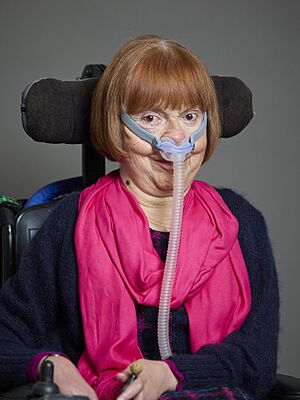Jane Campbell, Baroness Campbell of Surbiton facts for kids
Quick facts for kids
The Baroness Campbell of Surbiton
|
|
|---|---|

Official portrait, 2025
|
|
| Member of the House of Lords Lord Temporal |
|
| Assumed office 30 March 2007 Life peerage |
|
| Personal details | |
| Born |
Jane Susan Campbell
19 April 1959 London, England |
| Political party | Crossbench |
| Known for | Campaigner and adviser for disability reforms |
Jane Susan Campbell, Baroness Campbell of Surbiton (born 19 April 1959), is a very important British campaigner for the rights of people with disabilities. She is also a life peer in the House of Lords, which means she is a member of the UK Parliament who helps make laws.
Baroness Campbell has worked for many important groups. She was a Commissioner for the Equality and Human Rights Commission (EHRC). She also led the EHRC's Disability Programme. Before that, she was the Chair of the Social Care Institute for Excellence (SCIE). She also served as a Commissioner at the Disability Rights Commission (DRC).
Early Life and Health
Jane Campbell grew up in a place called New Malden in London. Her dad, Ron, was a heating engineer, and her mom, Jesse, worked in a clothes shop.
When Jane was a baby, her parents noticed she couldn't hold her head up well. Doctors at Great Ormond Street Hospital diagnosed her with spinal muscular atrophy. This is a condition that affects muscles. Doctors thought she might not live past two years old. Sadly, her younger sister, Sally, passed away from the same condition. As a child, Jane often got serious chest infections and sometimes needed to go to the hospital.
Education Journey
When Jane was young, she went to a special school just for disabled children. At this school, learning wasn't the main focus. She left school at 16 without many qualifications and found it hard to read or write well. But she knew she was smart.
In 1975, she went to Hereward College in Coventry. This was a special college for disabled students, but it had a strong focus on academics. There, she could enjoy life like other teenagers. In just three years, she earned six O-levels and three A-levels. After Hereward College, she studied at Hatfield Polytechnic. Later, she earned a Master of Arts (MA) degree from the University of Sussex. Her master's paper was about Sylvia Pankhurst, a famous person who fought for women's rights.
Career and Achievements
After college, Jane Campbell started her career in 1983 at the Royal Association for Disability and Rehabilitation (RADAR). In 1984, she began working for local government. She was an Equal Opportunities Liaison Officer for the Greater London Council (GLC). Then, she became a Disability Training Development Officer. In this role, she taught people about disability equality.
In 1987, she became a Principal Disability Advisor for the London Borough of Hounslow. A year later, she went back to the Disability Resource Team as Director of Training. She stayed there until 1994, when she started her own company to advise on disability issues. In the early 1990s, she also helped lead the British Council of Organisations of Disabled People (BCODP).
In 1996, Jane co-founded and co-directed a new group called the National Centre for Independent Living (NCIL). She worked at NCIL for six years. After that, she was chosen to be the Chair of the Social Care Institute for Excellence (SCIE).
Also in 1996, she co-wrote a book called Disability Politics. In 2000, she was given an award called the Member of the British Empire (MBE). In 2006, she received an even higher award, becoming a Dame Commander of the Order of the British Empire (DBE).
Jane Campbell has also received special honorary degrees. In 2003, she was given an honorary doctorate in law from Bristol University. She also received one in social sciences from Sheffield Hallam University.
She was a Commissioner for the Disability Rights Commission until it closed in October 2006. From 2006 to 2008, she was a Commissioner for the Equality and Human Rights Commission (EHRC). She also led the Disability Committee there.
On April 3, 2007, Jane Campbell became a life peer in the House of Lords. This means she was given a special title and a seat in Parliament for life. She sits as a crossbencher, which means she doesn't belong to a specific political party. Her official title became Baroness Campbell of Surbiton.
Baroness Campbell has campaigned on many important issues. These include the creation and later closure of the Independent Living Fund (ILF). She also worked on the Community Care (Direct Payments) Act 1996, which helps disabled people manage their own care. She has also spoken out about how the COVID-19 pandemic affected disabled people. She has also been involved in discussions about changing laws on assisted dying and how they might affect disabled people.
Personal Life
Jane Campbell met her first husband, Graham Ingleson, at Hereward College. They got married in 1987. Six weeks before their wedding, they found out Graham had contracted HIV from a blood transfusion. He passed away in December 1993. In 2009, Jane lived in Tolworth with her second husband, Roger Symes, who is a businessman.
Because of her muscle weakness, Baroness Campbell needs help with almost everything. She uses a special machine to help her breathe at night. She also uses an electric wheelchair and types on a computer with one finger. As of 2009, she received money from her local council to pay for her care. This allowed her to hire five carers to help her with daily activities.

